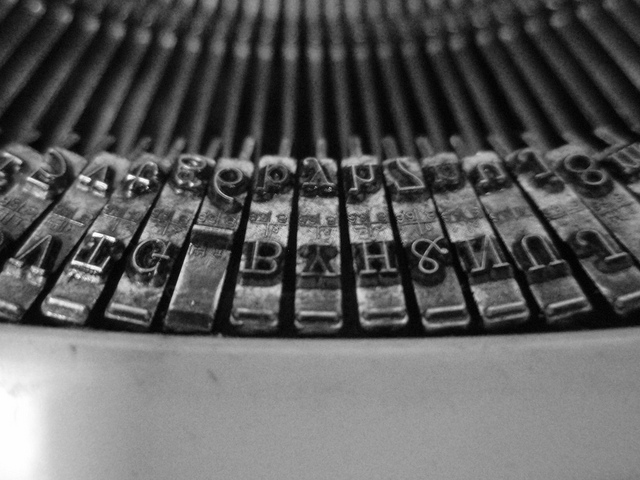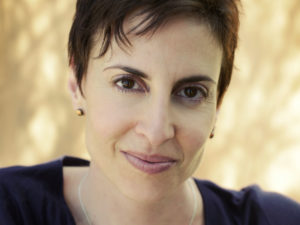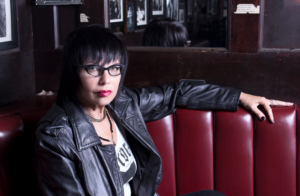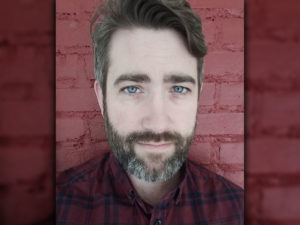
Frank Reardon was born in 1974 in Boston, Massachusetts and spent his first 28 years living there. Since then, he has lived all over the country, in places such as Alabama, Kansas City and Rhode Island. He currently lives in the Badlands of North Dakota while still looking for a way to get out. Frank has been published in various reviews, journals and online zines. His first book, Interstate Chokehold, was published by NeoPoiesis Press in 2009 as well as his second collection of poetry Nirvana Haymaker 2012. Frank has completed his third poetry collection Blood Music and it is due out late summer from Punk Hostage Press.
The Mortal Kids
michael lived
around the corner
from me
when he hung
himself.
it was said
that his girlfriend
dumped him,
so he went
into his
basement,
grabbed
a rope & bucket,
& jumped.
people said
his mother found him,
& she dropped
the 12 piece
bucket of chicken
she had bought
for dinner
by his feet.
she grabbed
his legs
& tried to push
him up,
trying to save his
already dead life.
they said
his fingers were broken
because when he dropped
he had changed
his mind,
putting his fingers
into the rope,
each one
snapping like
a twig
from the weight
of his swinging
body.
a lot of people
were at the funeral.
teachers who
did not teach him
& did not
know him
had a lot to say
about him,
girls & boys
who hated him
were holding
one another
& crying.
shannon & i
sat in the back
of Saint Teresa’s.
we did not say much
or do much.
we really did
not know him.
we got up & left
half way through
the funeral,
& we cut through
the woods in our
funeral clothes,
saying nothing
to one another.
& when we arrived
at shannon’s house,
we took our clothes off
& lost our virginity.
no words were ever said
between us
as we both sat there, naked.
feeling like a couple
of mortals
for the first time
was more
than enough.
“The Mortal Kids” seems to be a narrative reflection; can you discuss what triggered you to write about a childhood memory? What is gained, if anything, from this process of reflecting in regards to the work?
To be honest the poem is about when I lost my virginity. The girl I dated way back when “friended” me in the social networking world and then it just hit me, it all come back to me, I had not thought about it in ages. The kid in the poem, Michael, lived at the end of my street when I was 16. Having lived in a small town, his suicide is all everyone talked about for weeks. It was strange to think about it after all these years, but it also had a calming effect upon me too. What was gained from it was a perspective of how I was as a teenager. I was able to bring my younger self into the older self. How I thought then, how alive and innocent I was, the whole act at the end, the last two stanzas, happened just as I wrote them. All the frustration of seeing death for the first time depressed us both. The only thing we could do was have sex for the first time, it was the only thing that could ‘trump’ the situation at hand. I recall neither of us speaking to one another, we just did what we could do to forget what it felt like being mortals for the first time. Reflecting on it now it seems rather ridiculous, considering I have seen death numerous times, but I see our actions as pretty brave back then. It was my only way out, for both of us, at the time.
In this piece death/life are juxtaposed, Michael’s suicide with the narrator’s loss of virginity. This is a powerful parallel. Can you discuss the parallel?
The parallel/juxtaposition was not intentional; it was how it happened. I remember when we left the church we cut through the woods to Shannon’s house, she was in a dress and I was in a shirt and tie. I remember branches hitting us, dress shoes getting stuck in the mud. We were in a huge hurry to get to her house, and not for the sex; we had no idea that was going to happen. We were running from death itself without even knowing we were doing so. Everything was so real for the first time in our short lives. I am not even sure we knew what we were doing. We ditched the ride back home and opted to walk, we could have even walked on the sidewalk, but we took the difficult route home. When we got to her house I remember just sitting in her living room not saying a word, at the time it just seemed like hanging out. When you are younger and losing your virginity is supposed to be this massive happening, it’s supposed to be one of the highlights of your high school years. I cannot remember what we said to one another, I don’t think it was important, but what I remember is that we just took our clothes off and let it happen. It was life happening, being 16 it was probably the greatest bit of life I had experienced up to that moment, especially after death knocked on our door for the first time.
Your new book, Nirvana Haymaker, Neopoiesis Press, is your second collection. Can you discuss the collection as a whole and one or two accomplishments that you made in the collection?
Well, the book went through so many changes. I remember at first it was a lot like my first book, which I am not overly proud of. I was going through a stream of consciousness phase and Nirvana Haymaker, at first, was just another one of those books. Whenever I am putting together a book I am also writing other new poems. Nirvana Haymaker, as you know it now, came from those other poems. I am proud of this collection because it’s the first time I was able to stretch my legs and try new and different things. Being locked away in North Dakota without much vice I was able to really look into myself and just write. The title of the book, for me, has a lot to do with facing the past as a fighter, but more so of the mind. I was a massive drunk and drug abuser for a long time. I hurt a lot of people and did some crazy shit because I refused to face those problems. I suppose writing Nirvana Haymaker helped me face a few of those problems head on. It was not easy writing. I was seeing a shrink, I was going bat-shit crazy because I had some of these poems locked up inside of me for 20 or more years. I typically don’t follow a set theme for a book, such as ‘Frank Reardon’s Boston poems’, but the book did keep with the same feel and the same time.
Some of it was horrible, while some of it was just joy. I never understood how people could find “enlightenment” in a moment’s time, for me it has always taken years; there was always some sort of fight or battle going on to get to a moment of clarity. I could write a hundred more books, maybe even win awards one day, but none of them will be as special to me as Nirvana Haymker was and is. Writing the book saved me mentally, it showed me I was more than the bullshit lies I was shoveling onto people. It showed me I can do this sort of stuff for the rest of my life and be proud of it. I know the book wont win awards or gain anything beyond what it is, I have a long way to go as a writer, hell we all do, though writing this book and overcoming was and is a huge accomplishment for me. The new book coming in the fall was so much easier for me to write. A lot of the book contains peaceful observational poems, which I was never able to do before. Some are about the past like dealing with divorce. If I never wrote this book, I would not have been able to face and write about divorce or my daughter. I would have just kept it in and let it sour inside. The ease I am feeling with writing now, the joy I have when writing, the joy I get helping other writers who have just started out, is all due to writing this collection. I cannot ask for a bigger accomplishment than that.




